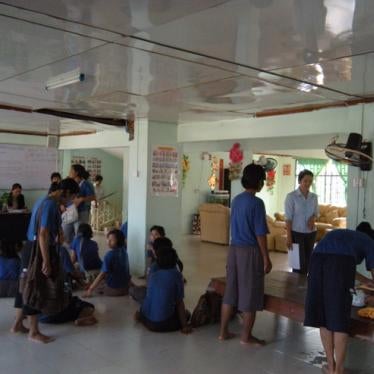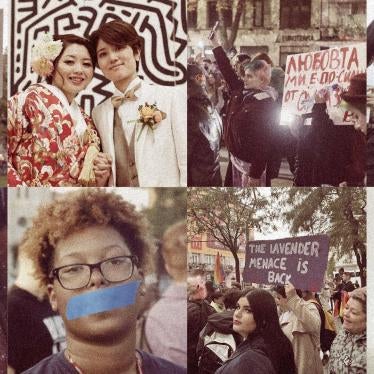The ILO Domestic Workers Convention was unthinkable just a few years ago. It represents the culmination of years of effort by domestic workers, advocates, and officials to shine a spotlight on a long-ignored but significant sector of the workforce, says Nisha Varia.
If someone had told me 45 years ago that we would be here today, I would not have believed it. We do not have to be slaves anymore. — Myrtle Witbooi, chair of the International Domestic Workers Network and former domestic worker from South Africa, Geneva, June 10, 2011
Growing activism against modern-day slavery has highlighted the abuse and exploitation suffered by millions of men, women, and children around the world. Donor funding has flowed to create shelters and services for victims while a proliferation of anti-trafficking legislation has focused on arresting and prosecuting traffickers.
Until recently the crucial role of prevention has enjoyed less visibility and support, but the growing domestic workers’ rights movement, and the development and adoption of a landmark treaty last year provides a promising example of how to move forward in the fight against forced labour.
While the break-up of an organized crime syndicate may seem a more obvious sign of progress, governments could make significant progress against modern-day slavery by ensuring robust, comprehensive legal frameworks protecting a range of human rights, including guarantees for labour protections as seemingly mundane as a minimum wage, a weekly day off, and limits to hours of work.
Overcoming initial scepticism and resistance, members of the International Labour Organization (ILO)—governments, trade unions, and employers’ associations—have done just that. On June 16, 2011, they voted overwhelmingly in favour of a new groundbreaking treaty that, for the first time, established global labour standards for the estimated 50 to 100 million domestic workers worldwide who clean, cook, and care for children, families, and the elderly in private households.
ILO Convention 189 Concerning Decent Work for Domestic Workers radically changes how domestic workers—the vast majority of whom are women and girls—and their work inside the home are valued, recognized, and protected. Its desperately needed and long overdue protections shake deeply entrenched gender discrimination in social and legal norms, and, in some countries, the lingering legacies of slavery.
I woke up at 5 a.m., cleaned the house and made breakfast for the children and worked all day. I went to sleep at 3 a.m. I never got a chance to rest…. The wife of the employer shouted and beat me every day…. The employer had my passport. The door was locked. I was not allowed to go out or even talk to the neighbours. I never received my salary. - Chain Channi, Cambodian domestic worker, Kuala Lumpur, Malaysia, April 12, 2011
In a review of 72 countries’ labour laws, the ILO found that 40 percent did not guarantee domestic workers a weekly rest day, and half did not limit hours of work. Many national child labour laws also exclude domestic workers, meaning employers can employ young children and make them labour for long hours, often at the cost of their education and health.
Over the past 12 years, Human Rights Watch’s research on domestic workers in countries as diverse as Indonesia, Saudi Arabia, the United States, Morocco, Guinea, and El Salvador has documented pervasive abuses and labour exploitation, including excessively long working hours without rest; unpaid wages for months or years; forced confinement in the workplace; food deprivation; verbal, physical, and sexual abuse; and forced labour including debt bondage and trafficking. Domestic workers, many of whom are migrants and at least 15.5 million of whom are children under the age of 18, who suffer such abuses typically have little access to redress.
Migrant domestic workers confront additional risks posed by language barriers, precarious immigration status, excessive recruitment fees, and employers’ confiscation of passports. Human Rights Watch investigations across Asia and the Middle East have documented the failure of many governments to monitor recruitment agencies that impose heavy debt burdens or to ensure that migrant domestic workers have access to courts, information about their rights, and support services when they face abuse.
Forging Global Labour Standards
The ILO convention was unthinkable just a few years ago. It represents the culmination of years of efforts by domestic workers, advocates, and officials to shine a spotlight on a long-ignored but significant sector of the workforce. These efforts focused on the ILO, with its unique tripartite structure in which workers’ groups, employers’ groups, and governments (183 countries are members) negotiate international standards, with all three component groups having a vote.
Speaking during the negotiations in Geneva, Maria Luisa Escorel, minister counsellor from the permanent mission of Brazil, Geneva, said: "The lack of protection for domestic workers represents a significant gap in the coverage of international labour standards…. Domestic workers around the world are looking to the ILC [International Labour Conference] to adopt a convention that would help to overcome past injustices and give domestic workers a better future."
Many governments initially expressed hesitation or direct opposition to a legally binding convention on domestic work, citing the impracticality of monitoring work in private households and their reluctance to add to a growing body of international labour standards, many of which had poor rates of ratification. However, lobbying by domestic workers’ organizations and NGOs, an ILO survey of laws and practices around the world, and compelling opening statements at the negotiations by the workers’ group and key governments made a strong case that the pervasive exploitation and abuse in this sector could no longer be neglected.
Some of the most contentious debates during the negotiations included regulation of employment agencies, elements of written contracts for domestic workers, provisions on social security and a healthy working environment, and how to account for working hours when domestic workers are not actively working but must be available to be “on-call.” Surprisingly, provisions on monitoring and inspections of private homes garnered little controversy during the final debate.
From the outset of negotiations, key governments provided decisive support, advocating strongly for binding standards that would extend equal labour protections to domestic workers. Delegates from Australia, Brazil, South Africa, the US, Argentina, and Uruguay spoke up repeatedly to introduce and defend strong provisions and to point to effective country-level examples of legislation and implementation.
As negotiations progressed, support for the convention grew. Some states with initially hostile attitudes changed their positions as they heard evidence of the abuses against domestic workers and concrete examples of how legislation in a diverse array of countries could improve domestic workers’ rights. Members of the Gulf Cooperation Council (Bahrain, Kuwait, Oman, Qatar, the United Arab Emirates (UAE), and Saudi Arabia), along with Bangladesh, Indonesia, and India, reversed early opposition to a legally binding convention and expressed support in the final vote.
In the end, on June 16, 2011, the newly negotiated standards won overwhelming support, with 396 delegates (representing governments, workers, and employers’ associations) voting for the convention, 16 voting against, and 63 abstaining. Swaziland was the only government to vote against the convention.
The ILO Domestic Workers convention guarantees domestic workers labour protections equivalent to those of other workers, including for working hours, minimum wage coverage, overtime compensation, daily and weekly rest periods, social security, and maternity leave. The new standards oblige governments to address the minimum age for children in domestic work and their right to attend school, protect domestic workers from violence and abuse, regulate recruitment agencies and fees, and set out measures for effective monitoring and enforcement.
Translating Standards into Change on the Ground
While we celebrate this historic moment, we also know that there are many challenges to face in our struggle to ensure that these rights, now enshrined in Convention form, are upheld, protected, and defended. - Migrant Forum in Asia, statement, Manila, June 16, 2011
Adopting a new convention is only the first step in a long, difficult campaign for widespread ratification and implementation. Encouragingly, although the process is slow, many countries are reviewing and revising their national legislation to bring it into conformity with the convention. Dozens of countries worldwide have submitted the convention to the appropriate national authorities for review. Uruguay, the Philippines, and Mauritius have been the first to ratify the convention, which will become legally binding in September 2013, and several Latin American countries will likely complete their formal ratification processes soon.
Whether governments are close to ratifying the convention or not, they will feel pressure to respect the standards it sets forth. For example, several countries are in the process of adopting legislation on domestic work, such as Kuwait, the UAE, Lebanon, and Indonesia, and they will consult the standards as they finalize their laws. Singapore and Malaysia, two of the nine countries that abstained when the convention was adopted, will find it in their interest to introduce reforms anyway to remain an attractive destination for migrant domestic workers who can increasingly opt for better working conditions and pay elsewhere. After years of rejecting the need for reform, Singapore finally agreed to require a weekly rest day for domestic workers.
Discrimination and exploitative practices are deeply entrenched and recognition and respect for domestic workers’ rights will not improve overnight. To make the new standards count, advocates must strengthen efforts at the national level to replicate their success in Geneva. They must also raise public awareness among key constituencies such as national labour officials, employers, trade unions, and the media. They will then need to build momentum around ILO ratification and related legislative reforms.
Because the strength and diversity of the domestic workers’ movement varies greatly by country and region, another priority is to provide international support to national and regional groups as needed. This may entail defending freedom of association for domestic workers, providing financial and organizational support to fledgling groups, or building alliances among domestic workers, labour, migrants, women’s rights, and children’s rights organizations.
Finally, dissemination of best practices and lessons learned, particularly on experiences with successfully enforcing domestic worker protections, will be crucial for ensuring that strong global standards turn into concrete improvements in local practices.
Governments may never be able to count the number of women and girls who escape getting trapped into domestic servitude due to better labour standards. But by closing gaps in legal protections and enforcement, they will no longer be providing employers the tacit permission and leeway that has allowed exploitation of domestic workers to flourish.
Nisha Varia will be speaking at the Trust Women Conference in London, December 4th-5th.







